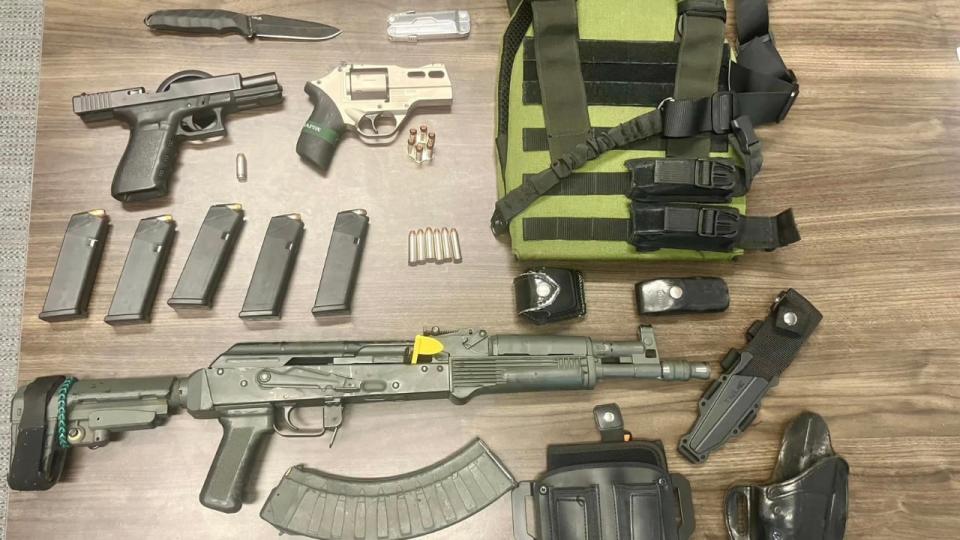May 19—Should the Albuquerque City Council have more of a say in the hiring and firing of key positions?
City Councilors Dan Lewis, Klarissa Peña and Renée Grout have introduced four charter amendments — changes to the city’s foundation document requiring voter approval — including one altering the removal process for the police or fire chief.
Proponents of the measures and the mayoral administration disagree on their impact.
Lewis said, currently, the council doesn’t have a meaningful role in hiring important positions such as the city attorney or city clerk. The amendments, he said, would give the council a stake in the process.
But Mayor Tim Keller said they could make attracting candidates more difficult and make important figures beholden to a myriad of different interests. Common Cause New Mexico and the Center for Civic Policy sent out a statement Friday expressing concerns about the proposals being “undemocratic.”
Before voters can have their say in November, the City Council has to vote to place the question on the ballot.
Here’s what’s on the table:
Cause and effect
Proposal would change removal process for chief of police, fire chief
As written, the proposal would allow councilors to remove the police chief or fire chief with a simple two-thirds vote — and without cause, which is currently required under the city charter. Neither the mayor nor the City Council can remove one of the chiefs without a reason to fire them, for instance, a violation of a city rule or ordinance.
Keller said, currently, he answers for the people he appoints. If that is switched to nine councilors plus the mayor, he said, it “diffuses that accountability.”
“When we set up our city charter, the logic was that there’s one elected official that represents the city as a whole … to prevent uneven favoritism by council district,” Keller said. “The mayor should be responsible for those positions and there’s a direct line of accountability.”
But the language around cause may change. Councilors Lewis and Peña both said they plan to introduce amendments to the proposal. Peña said she’s planning to increase the needed number of votes to seven out of nine councilors, or a supermajority.
“The supermajority — that’s almost impossible,” Peña said. “If the fire chief or the police chief just did something that was unacceptable, and you get seven out of nine councilors, that’s very clear that something needs to give.”
Lewis said he plans to reinsert the cause requirement to quash any concerns that, fearing firing at whim, the chief of police and the fire chief wouldn’t be able to act independently. The removal of cause has prompted concerns that, with less job security, it would be more difficult to attract candidates for the positions.
“These positions do need to have some level of independence from the council and from the mayor,” Lewis said. “So we’re going to amend that part of it next week at the next council meeting.”
But Lewis said he’d like to define and clarify how cause is determined.
Another provision in the proposal would limit to 90 days how long an interim can serve in either role, in an effort to speed up the hiring process. Lewis said he’s amenable to extending that time period to a “reasonable” number of days.
That’s another pain point for Keller, Chief of Police Harold Medina and Fire Chief Emily Jaramillo. On Tuesday, Jaramillo said in her experience, 90 days would be insufficient, especially close to a mayoral election. Who, Jaramillo said, would take on a chief position without knowing who their boss would be?
Peña said the proposed amendment was not prompted by recent controversy over APD and its leader, including an FBI investigation into several officers in the DWI unit and a car crash involving the chief.
“I’m actually a proponent of Chief Medina. I think he’s done a great job,” Peña said. “… Obviously, there are things that happen during people’s tenures, and I think they’ve been addressed sufficiently. That being said, I think this is more about the responsiveness to the council as a whole.”
Majority rules
Proposal would decrease minimum votes needed to become a city councilor, mayor
Another change would take the city back in time — to 2012, to be exact, the year before voters decided to bump the minimum votes needed from 40% to 50%. Voters sided 55% in favor of increasing the required vote threshold to win a mayor or council race.
Supporters say it would reduce the need for expensive runoff elections. In 2021, it cost $375,000 to conduct two runoff races for City Council Districts 7 and 9, and City Clerk Ethan Watson said Tuesday it costs about $500,000 now to hold a runoff election.
Lewis said reducing runoffs can ensure that every vote counts.
“We’ve had great voter turnout in recent years in the first elections, but usually that voter turnout in those runoff elections are diminished,” Lewis said.
Mason Graham, policy director for Common Cause New Mexico, called the proposal “dangerously anti-democratic,” and said ranked-choice voting or instant runoff elections could be a good alternative.
“If the City Council wishes to create a truly equitable and representative electoral process without having to fund expensive, low-turnout runoff elections, the obvious solution is to introduce instant runoff elections like Santa Fe and Las Cruces,” Graham said.
Most recently, the amendment would have prevented a runoff in the 2023 District 6 race, when now-Councilor Nichole Rogers gained more than 40% in the regular local election.
Since 2013, there have been a handful of times that the amendment would have made a difference. In 2019, Isaac Benton, who ultimately won the runoff election, received 42% of the District 2 vote — none of his closest competitors hit the 40% margin. In 2021, the amendment would have prevented a runoff in the District 9, which Councilor Renée Grout won.
But although Councilor Brook Bassan received 49% of the vote in the 2019 District 4 vote, so did another candidate.
Several other runoff elections for mayor and council would have been unaffected by the proposed rule.
Keller was unsure if voters would be interested in reversing the decision.
“If you ask folks, would they want their elected official to have 40% of the vote to win, or 50%?” Keller said. “Most people agree that they should have a majority to govern.”
City clerk and city attorney hiring
Proposal would create a hiring committee for city clerk and city attorney
Another proposed amendment would change how the city clerk and the city attorney are hired. Both City Attorney Lauren Keefe and City Clerk Ethan Watson said they applied to a posted job. The amendment would create a committee, including two mayoral and two council appointees, to recommend qualified candidates.
As the legislation is written, both roles would now need employment contracts that allow for early termination, either initiated by the mayor with the support of five councilors or by the council alone with a two-thirds vote.
But Lewis said he plans to introduce an amendment to keep both roles for cause, rather than at will, to ensure their independence. The remaining changes wouldn’t impact that, he added.
“The hiring process doesn’t threaten their independence,” Lewis said. “It just gets the council involved in bringing those positions on.”
Lewis said that in some ways, the city attorney works for councilors and the mayor — as well as every other attorney working at City Hall.
“City councilors need attorneys … we make decisions that require legal analysis, a legal defense at times,” Lewis said. “The city attorney works for the City Council in the same exact way it works for the mayor, so it makes sense that the council would be involved in the hiring process.”
Keefe said she frequently works with councilors to draft or consult on legislation. But attorneys, Keefe said, have obligations to their clients, and in Keefe’s case, she is obligated to follow the mayor’s directives, which could raise conflicts of interest if the amendment is adopted.
Church and state
Proposal would create new policy for filling committee vacancies
The committee that mediates separation of powers disputes between the City Council and the mayor has been unfilled for several years, Keller said. This charter amendment would create a provision to fill vacancies.
If one body doesn’t make an appointment in time, the other one gets to pick. If two appointees of either the council or the mayor resign in a year, the other gets to select their replacements.
Keller acknowledged there’s been difficulty filling positions on the board but said he soon plans to ask the council to confirm a new appointee. In seven years, Keller said he has been notified by the board twice.
Lewis said there are “many instances” in which a fully operational committee would help solve issues without going to court, but there haven’t been enough appointees to make that possible.
And Keller seemed to agree.
“If we would just use this board, we wouldn’t need all these charter amendments,” Keller said. “That’s the irony.”
Signup bonus from





